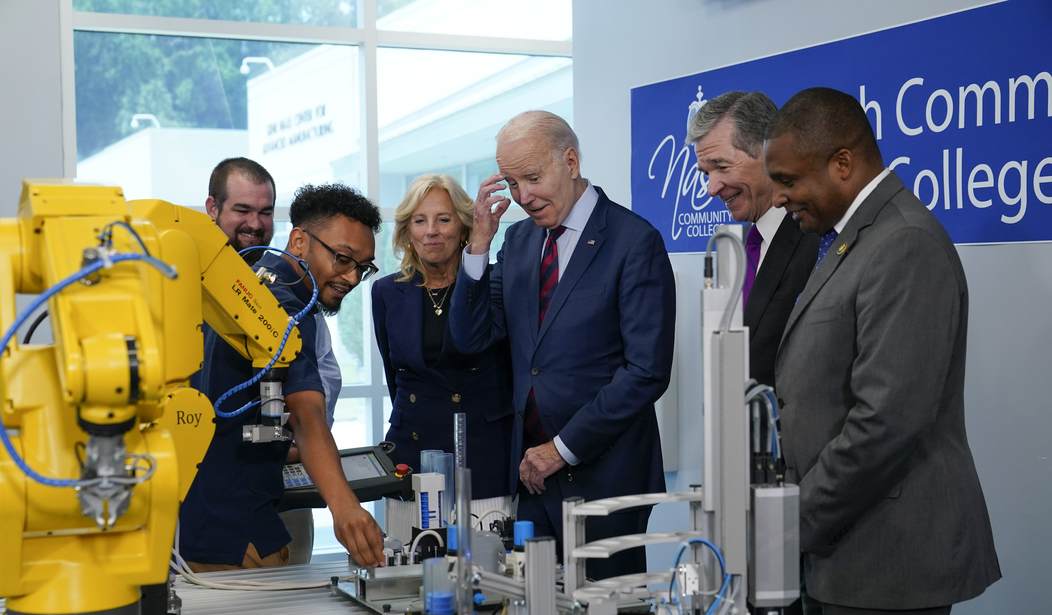The administration courtiers are working overtime to keep their jobs as "Joe Biden." Joe Biden is more a brand name for a political package than a reference to a specific person. Staffers speak for him, think for him, and possibly decide for him. There's no way of knowing for sure to what extent things come from him personally because the individual in the package is only part and possibly the least important aspect of the overall product. The Huffington Post explicitly suggested that the president should actually be synthesized to avoid burdening his youthful, progressive message with his tired old body.
Joe Biden is old and has had a lifelong stutter. ... AI augmentations and video renderings could serve to smooth out these bumps while allowing the Biden campaign to effectively disseminate true information about the state of our democracy and the Biden administration’s accomplishments. The president has limited time to campaign as he also focuses on running the country, and AI would be a cost-effective and efficient way to communicate his message personally and directly to voters.
To those who object that this would constitute a deception, the rebuttal is that an AI-generated persona would not only be the ethical 'real' Joe Biden, it would be 'realer' than his halting, declining physical self. As Stephen Wolfram observed, the concept of a soul is a description of the computational essence of a mind, an abstraction that is independent of the details of the physical substrate on which it runs. So long as Biden's soul can be said to exist, it can be projected independent of the fleshy substrate with which he is lumbered.
The idea is not completely new. As a political symbol in "1984," Big Brother was always greater than a mere man, the better to rise above the crowd. "In the novel, it is never explicitly indicated if Big Brother is or had been a real person … No one has ever seen him and there is a reasonable certainty that he will never die. He is simply 'the guise in which the Party chooses to exhibit itself to the world'." He is a creature of the Ministry of Truth. Emmanuel Goldstein, Big Brother's archenemy, may be similarly fictitious, an undying object of hatred to act as INGSOC's foil. Ever since Orwell introduced us to the possibly mythical Big Brother and the equally imaginary Emmanuel Goldstein, INGSOC's heirs have been trying to create a virtual politics. At the moment of his perceived physical weakness, Biden's supporters argue that Biden need not be a mere man, nor is his electoral foe Donald Trump an ordinary villain.
There is no greater comparison than Biden vs. Trump. It is the classic confrontation of good versus evil, and the American people need to decide whether we choose to maintain a constitutional republic, or support an authoritarian, belligerent, vindictive form of government.
It's a battle between symbols, progressive vs. reactionary, good vs. evil. Why should such high things be subject to the thousand natural shocks that flesh is heir to? Are the images of Joe Biden and Donald "Goldstein" Trump really representations of the actual people? The latest answer is "Who cares?" so long as they represent the conflicting narratives and continue to employ the staff writing those policies, press releases, and position papers.
The idea of a virtual politician was first mooted by academics in 2019. But as conceived, such figures would be the culmination of an algocracy in which 'fair' machines decide in place of corrupt humans what government ought to do.
The AI-enhanced Biden proposed by the Huffington Post would be a Frankenstein monster, a Max Headroom avatar controlled from smoke-filled back rooms. It is this bizarre hybrid the public is witnessing take shape. Big Boy the politician, not the hamburger. An old man is led offstage, reads from the teleprompter, answers "suggested questions," and rambles on TV, but the documents attributed to him are laser-sharp as if someone else had written them. A virtual candidate without even the benefit of algocracy. Rather than denying this, his handlers seem to say, "What's wrong with that? It's the team you're electing."
This defiant question deserves an answer. Perhaps in this age of virtual politics, it's time to fight AI with AI. Synthetic candidate vs. synthetic candidate. What's wrong with that? If you answer "everything," aren't you just being old-fashioned?
Perhaps it is old-fashioned to desire some connection between politics and what was once called physical reality. Legends and facts become mixed even when we want to keep them apart. Polls show that some 23% of Britons think Winston Churchill was a myth, while the majority reckon Sherlock Holmes was real. Forty-seven percent thought King Richard the Lionheart was a myth and Florence Nightingale did not exist. Three percent thought Charles Dickens was fictional. It is hard to separate truth from wish.
Also for our VIPs: The Man Who Was Not There
Perhaps one day America will hold the first fantasy election in history, a contest between two caricatures. But for the present and for whatever it is worth, America's founders, who were real people, intended governance to be the province of real, natural persons. They would have understood the election in November 2024 to be between the actual Joseph Biden and the real Donald Trump. Whether that actually happens is anyone's guess.










